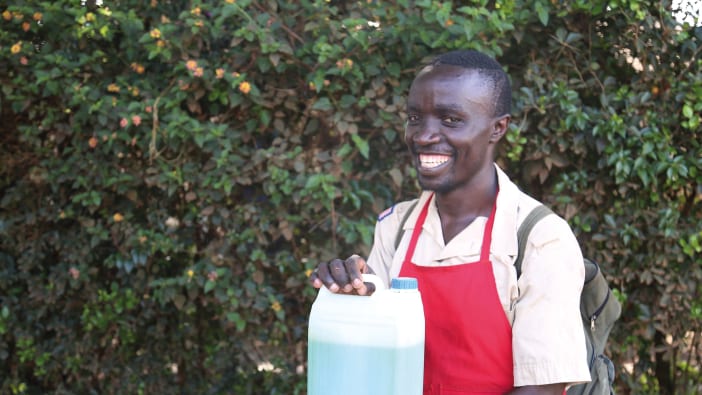by Isabel Carter and Ted Lankester.
Developing partnership
Primary health care is often only thought of in medical terms. However, the key to successful community based health care is to work in partnership with the community. This, an often revolutionary aim, is too often neglected.
As health workers, our chief task is to enable communities to set up and manage their own health programmes. When health care is provided through large curative institutions, funded by the government and other agencies and dominated by doctors, people come to expect things to be given to them and done for them. However, our aim should be to promote health care with the people, not to provide medical care for them.
Partnership will bring dignity to the poor. People soon realise that they no longer need others to do things for them, or give things to them. They come to see that they can do things and obtain things for themselves. This new self-reliance gives a sense of value and worth. The ASHA project in India has transformed the lives of many of the women training as CHWs. They have developed a sense of self-reliance, determination and power - realising that together they can make real changes in their communities. Partnership means that equipment is better looked after. When people feel it is their clinic, their forestry plantation, their water pump, they will take pride in looking after it.
Preparing ourselves
We will never work in genuine partnership unless our own minds and attitudes are carefully prepared. We will need to be...
- Really committed to the idea of participation.
- Ready to share knowledge and skills at every opportunity. All too often a project may depend too much on the skills and energy of one person. If only one person can do certain tasks, then it is time to pass on those skills.
- Flexible - being prepared for mistakes, delays and experiments.
- Ready to trust others.
- Ready to give respect and credit to others. ‘Our job is not to be heroes ourselves but to make heroes of other people.’
- Prepared for a long-term commitment as facilitator.
- Willing to give up control and stop being the boss. Aim to pass on leadership and training skills to many people instead of just working alongside one or two individuals.
The biggest block to participation is not the unwillingness of the community. It is the possessive attitude of the health worker wanting to gain credit and keep control.
Preparing the community
Partnership will not just happen if we arrange a few meetings and hope for the best. Like other community health skills, the ability to bring about participation has to be learnt and practised. At the beginning, many of the poorest, neediest and most exploited communities will not be ready to participate.
How can we ‘teach’ participation?
- By building trust and friendship and by making our aims clear.
- By starting discussion groups. These can consist of interested community members, CHWs, community leaders, etc. A project member can act as facilitator and guide the discussion. Problems will be raised and real causes can be identified. For example, we can use the ‘but why’ approach:
‘The child has an infected foot.’
‘But why?’
‘She stepped on a thorn.’
‘But why?’
‘She has no shoes.’
‘But why?’
‘Her father is a landless labourer and cannot afford them.’
Solutions can be discussed and suggestions can now be followed up. This approach to participation quickly leads on to awareness raising. This is an essential part of community development and is a valuable tool in community health. - By arranging visits to other projects. ‘Most visions are caught, not taught.’
First steps in partnership
It is helpful for the community first to learn how to take an active part in one main activity. Later this can be extended to others.
A good subject to choose should be seen as a need by the community, should be within reach, and should bring an early, obvious benefit.
For example, one project was able to work with the community in sinking tubewells, so bringing clean drinking water and ridding the community of guinea worm. All were excited and wanted to work together on a further activity.
Other improvements may not be so immediately obvious. The community may fail to notice changes unless they are helped to look back and see how much things have improved since they started. We must teach the community to evaluate progress in terms of real changes.
Avoiding the pitfalls
Common ones include...
- Partnership is in name but not in practice. Participation may seem to be present; community members join in, but more as workers than as partners - more on the project’s terms than on their own terms.
- Partnership fades away. We may originally aim for genuine community partnership. When the health committee chairman runs off with the funds, we may quickly change our minds!! We must keep encouraging participation even when problems arise and we are tempted to retake control.
- Partnership may lead to division. The process of partnership may get out of control. Issues raised may be so strong that they split and destroy communities.
Participation is a powerful process. Carried forward correctly it can help the poor, include the rich and benefit the community. Handled wrongly, it can leave a community wounded and unstable.
Supporting the community health worker
When first trained, the CHWs will rely heavily on the health team and the supervisor. The community may not believe in them, their families may mis-understand them; they may scarcely believe in themselves. They will need back-up and regular meetings with the other CHWs to encourage them, and to see that others are facing similar situations.
The village health committee is a vital part of the support for a CHW. The committee should be made up of committed, responsible villagers who have a concern for the poorer members of the community. Members should be encouraged and receive training for their role.
As they gain in maturity and knowledge, the CHWs will learn self-dependence and outside support will be less necessary. They will receive more of their encouragement from the community and their own sense of self-worth.
Should a CHW be paid?
This is one of the hardest questions to answer in community based health care. Arguments over CHW salaries are one of the commonest causes of failure in primary health work.
Wherever possible we should aim to set up CHW programmes in partnership with the community where CHWs are unpaid. This may be possible under the following circumstances:
- Where CHWs work a maximum of two days a week, ideally less. This means each CHW will be able to care for 100 families or less.
- Where CHWs possess a strong sense of social or religious motivation.
- Where CHWs receive their support and encouragement in ways other than through payment. Job satisfaction and the appreciation of the community are common examples.
- Where at the start of the programme, everyone understands that payments will not be provided and that CHWs will work out of service to their community.
It needs to be made clear that appointment as a CHW is not a path to fame and fortune either for the CHW or their family!
If payment does appear to be essential, there are various methods that can be used.
- Payment through a health committee is very useful if this can be organised. Ideally the community so values their CHW that they are willing to pay them and are able to work out a fair and efficient way of collecting and paying out the money. But the CHW must be mature, motivated, trained and honest!
- Payment for treatment from each patient as they are treated. This can work well, but the main drawback is that fees are often based on medicine used. This conflicts with one of the main roles of the CHW - to help improve the health of the community so that illnesses become less common and medicines become less necessary.
- The Government may provide funds, but may also wish to exercise control over the project. Government funds should ideally be channelled through the project or health committee.
- Outside funding agencies may seem the simplest or, indeed, the only solution at first. But once outside funding begins, people’s expectations may rapidly increase.
Don’t start paying salaries that cannot be maintained. The world has too many CHWs who were well paid at the start and have now stopped working because the project has run out of money. It is better for CHWs to start receiving no wages or low wages that can continue, rather than high wages that have to be stopped.
In conclusion, community involvement seems to be the basis of almost every successful, long-term health programme.
Genuine partnership will make a project permanent. If people themselves learn to change wrong health patterns and adopt correct ones, then when the experts leave and the funding stops, their health will be permanently improved.
This article was compiled by Isabel Carter, based largely on material from Dr Ted Lankester’s new book ‘Setting Up Community Health Programmes’ (which will be reviewed in the next issue). We would welcome letters which continue the discussion on these issues.









